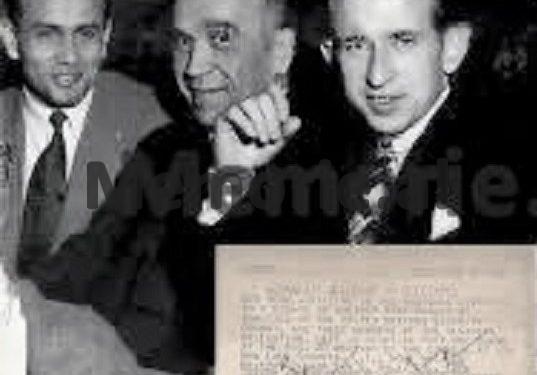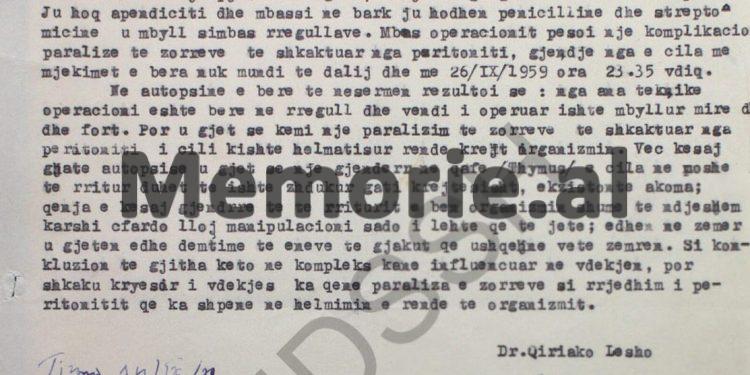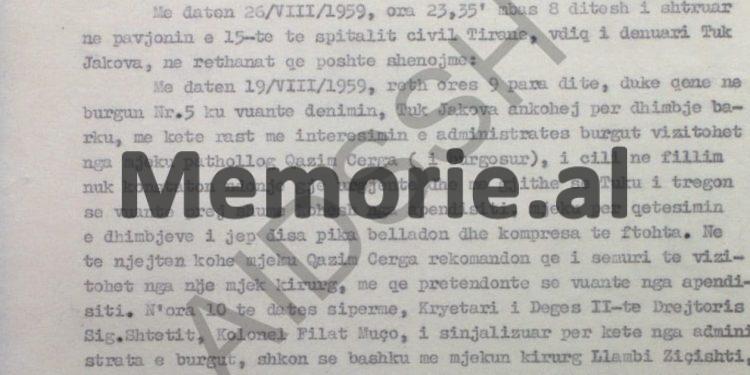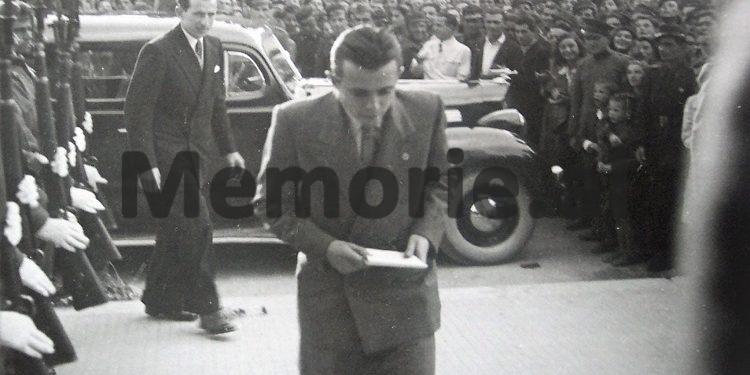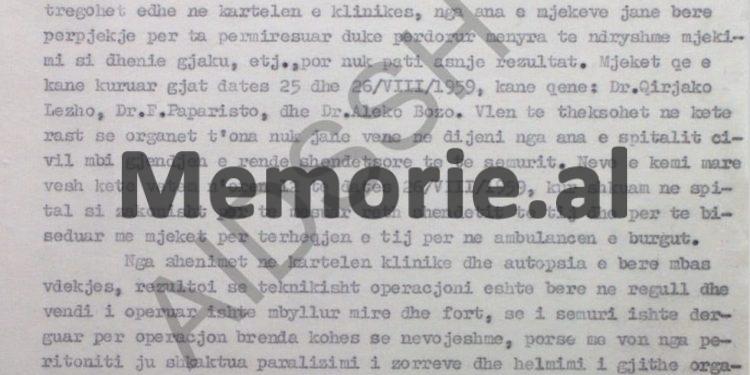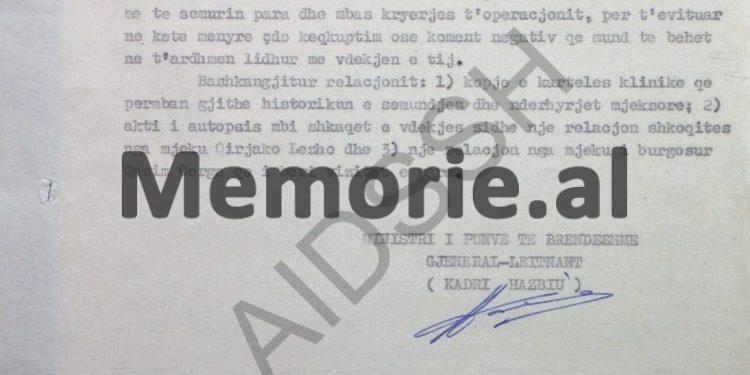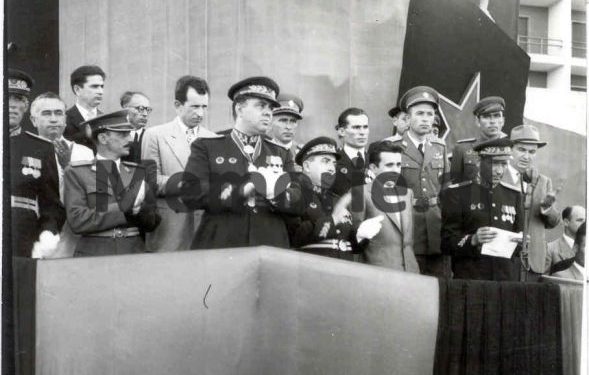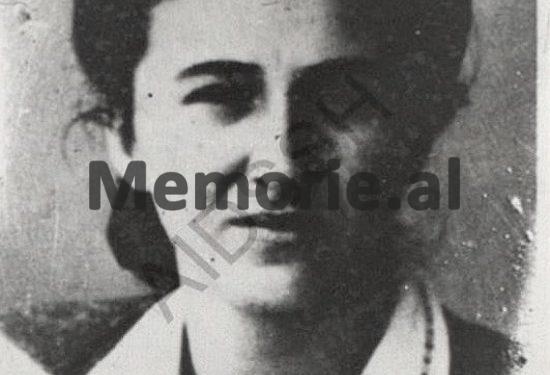Dashnor Kaloçi
Part thirty-three
Memorie.al/ publishes some archival documents issued by the institution of the Authority for Information of Former State Security Files, where there is a voluminous file belonging to Tuk Jakova, who since the period of Zog Monarchy, was one of the leaders of the Communist Group of Shkodra, sentenced to political prison in the famous trial of 1938, together with Qemal Stafa and Vasil Shanton, participant in the founding meeting of the Albanian Communist Party and member of its Central Provisional Committee, since the founding meeting of November 8, 1941, political commissar of the First Assault Brigade and the First Corps of the National Liberation Army, where from the end of the War, in November 1944 until 1955, he held several senior party and state functions and duties. , as: member of the Politburo and secretary of the Central Committee of the Albanian Communist Party, full ambassador of the People’s Republic of Albania in Belgrade, President of the Trade Unions of Albania, Minister of Finance and Deputy Prime Minister of the Albanian government, headed by Enver Hoxha, etc. The entire voluminous file (forms and investigative) that is published for the first time by Memorie.al., Where there are hundreds of unknown documents, in charge of the former lieutenant general Tuk Jakova, (“People’s Hero”), which belong to the period 1951-1959, when he, after numerous contradictions with Enver Hoxha since the end of the war, in 1951 was expelled as a member of the Politburo and in 1955, he was expelled from the Central Committee of PPSh, being dismissed from all party and state functions, which he had held until then, was interned with his family in the district of Berat, where after working for some time as head of the Carpentry Department in that city, in 1957 was sentenced to solitary confinement in Kanina Castle, Vlora district, where he was arrested in 1958, sentenced to 20 years in prison, accused of being a “traitor and enemy of the people”, until he died in the Prison Hospital. of Tirana in 1959, in mysterious circumstances! What is said in the secret documents (reports, photographs, cards, forms, report-information, notes, minutes, surveillance reports, plan-measures, statements, denunciation letters, etc.) belonging to the period 1955-1959, when he was under constant surveillance and surveillance by the State Security bodies, who were the officers of the bodies of the Ministry of Internal Affairs, who were in charge of his surveillance, and the names and nicknames of the Security collaborators, who kept him under strict control. ?!
Continued from the previous issue
The document with the report on the death of Tuk Jakova in the Civil Hospital of Tirana on August 26, 1959, compiled based on the clinical file of the Autopsy Department and the diagnosis that caused his loss of life, signed by Dr. Qirjako Lezho
Report
On the death of Tuk Jakova that occurred in the Civil Hospital Nr. 2 dated 26 / VIII / 1959.
Based on the clinical file and the Autopsy Department it results that:
The patient was admitted to the Hospital on time without delay on 19 / VIII / 1959, with the diagnosis: ‘acute appendicitis’, at 17:05 ’. At 18:00 on the same day, he underwent an operation where he was found with an acute appendicitis with a small gangrenous and perforated tip. You had appendicitis removed and after penicillin and streptomycin were injected into your abdomen, it was closed as per the rules.
After the operation, he suffered a complication of intestinal paralysis caused by peritoneum, a condition from which he could not cope with the medication and on 26 / IX / 1959 at 23:35 ‘he died.
In the autopsy done the next day, it turned out that: technically the operation was done in order and the operated place was well and tightly closed.
But it was found that we have an intestinal paralysis caused by peritonitis, which had severely poisoned the whole organism. In addition during the autopsy it was found that a gland in the neck (Thymus), which in adulthood should have disappeared almost completely, still existed; The presence of this gland in adults makes the body very sensitive to any kind of manipulation, no matter how easy it may be, and damage to the blood vessels that feed the heart itself was also found.
In conclusion all these in the complex have influenced death, but the main cause of death has been intestinal paralysis as a result of peritonitis which has led to severe poisoning of the organism.
Tirana, on August 27, 1959
Dr. Qiriako Lezho
The ‘Top Secret’ document sent to the Secretary of the Central Committee of the ALP, Hysni Kapo, by the Minister of Internal Affairs, Lieutenant General, Kadri Hazbiu, regarding the death of Tuk Jakova in the Civil Hospital of Tirana, after the surgical intervention that was done by Dr. Qirjako Lezho
THE PEOPLE’S REPUBLIC OF ALBANIA VERY SECRET
MINISTRY OF INTERNAL AFFAIRS
DIRECTORATE OF SIG. STATE Tirana on, 14 / XI / 1959
No. 05- 338
LANDA: On the death of the convict Tuk Jakova
CENTRAL COMMITTEE OF P. P. ALBANIA
SHOKUT HYSNI KAPO
Tirana
On 26 / VIII / 1959, at 23.35 ‘, after 8 days in the 15th Ward of the Tirana Civil Hospital, the convict Tuk Jakova died, in the following circumstances:
On 19 / VIII / 1959, around 9 am, being in Prison No. 5 where he was serving his sentence, Tuk Jakova complained of abdominal pain, on this occasion with the interest of the prison administration, was visited by pathologist Qazim Cerga (prisoner), who at first does not notice anything urgent and despite Tuku telling him that he had been suffering from appendicitis for a long time, the pain reliever doctor gives him a few drops of belladonna and cold compresses. At the same time, Dr. Qazim Cerga recommends that the patient be visited by a surgeon, claiming that he was suffering from appendicitis.
At 10:00 ’of the above date, the Chairman of Branch II of the Directorate Sig. The state, Colonel Filat Muço, signaled for this by the prison administration, goes together with the surgeon Llambi Ziçishti, who after visiting him, did not notice any particular pain of appendicitis (this probably from the sedation caused by drinking belladonna), nevertheless recommends to be kept in observations and in case the pain would recur, to be sent once to the hospital.
Since around 15.00 ‘the pain started to be felt again, based on the recommendation of the surgeon Llambi Ziçishti, accompanied by Colonel Filat Muço, the patient was taken to the civil hospital where he was taken by doctor Qirjako Lezho, who accompanied by doctor Arqilea Andrea and nurse Naile Ramku, after making all the necessary preparations for surgery, at 18.00 they operated successfully. After the operation, the patient felt well and for this he thanked the doctors and the Colonel for the care shown.
From 19 / VIII / 1959 to 24 / VIII / 1959, apart from the usual pain of the operation, not only was there no discomfort and pain, but the wound was going to normalize so much that we thought we would take him for further relief and treatment in the ambulance of the prison where he was serving his sentence.
On 24 / VIII / 1959, d.m.th. 5 days after the operation, the patient Tuk Jakova suffered a paralytic complication of the intestines, caused (as after the clinical card and autopsy), by peritonitis that gave instoscation throughout the body. This condition continued until 23.35 on 26 / VIII / 1959, at which time, despite the continuous interventions of the doctors of the civil hospital No. 2, it was not possible to escape death.
Throughout the day 26 / VIII / 1959, when the patient is in a deteriorating health condition, as shown in the clinic file, doctors have made efforts to improve it, using various methods of treatment such as blood donation, etc., but to no avail. The doctors who treated him during the 25th and 26th / VIII / 1959, were: Dr. Qirjako Lezho, Dr. F. Paparisto and Dr. Aleko Bozo.
It is worth mentioning in this case, that our organs have not been informed by the Civil Hospital about the serious health condition of the patient. We found out about this only at 12 o’clock on 26 / VIII / 1959, when we went to the hospital as usual to find out about his health and to talk to the doctors about his withdrawal to the prison ambulance.
From the notes in the clinical file and the autopsy performed after death, it resulted that technically the operation was done in order and the operated place was closed well and tightly, that the patient was sent for surgery within the necessary time, but later, from peritoneum caused intestinal paralysis and poisoning of the whole organism.
During the autopsy, there is also a gland in the neck (thymus) which in adults must have completely disappeared. The presence of this adult gland makes the body very sensitive and unable to resist the necessary medications. Damage to blood vessels was also found in the heart.
As for the conclusions of the doctors, nothing remains to be suspected about his death, however this is a problem that should be followed by our organs especially to clarify that after performing the operation, given the consideration that the doctors or the service staff of the hospital had towards the patient as a convicted anti-party element, they did not show the proper interest in his regular and continuous treatment, although in this regard, based on the interest of our organs, there does not appear to have been such neglect.
The doctor who operated on Qirjako Lezho is A.P., a good surgeon and deputy director for the technical side of the Civil Hospital No. 2, his wife is of Yugoslav origin, but in her direction our organs have nothing negative. With the same guarantees are the other doctors who have participated in his treatment.
In this matter, our bodies have a heavy responsibility, for the fact that:
They did not evaluate the issue enough and immediately informed the Central Committee of the Party about his illness and operation.
They did not take the necessary measures for his family to be aware of the disease and to get in touch with the patient before and after the operation, in order to avoid any misunderstanding or negative comments that may arise. is done in the future in connection with his death.
Attached to the report: Copy of the clinical file containing the entire history of the disease and medical interventions. The act of autopsy on the causes of death as well as a scathing report by the doctor Qirjako Lezho and a report by the imprisoned doctor Qazim Cerga who made the first visits. Memorie.al
MINISTER OF INTERNAL AFFAIRS
GENERAL – LEITNANT
KADRI HAZBIU




